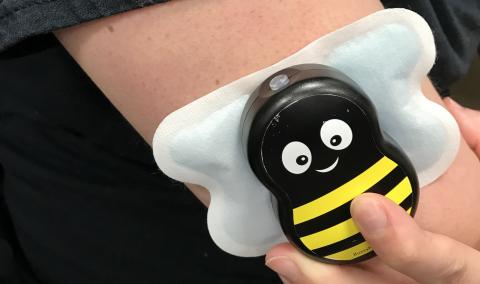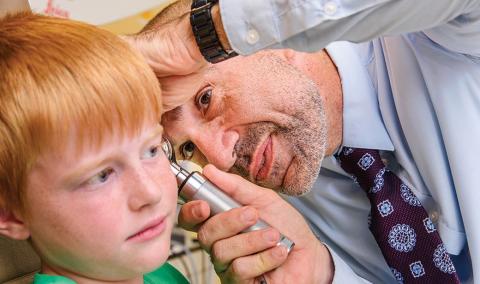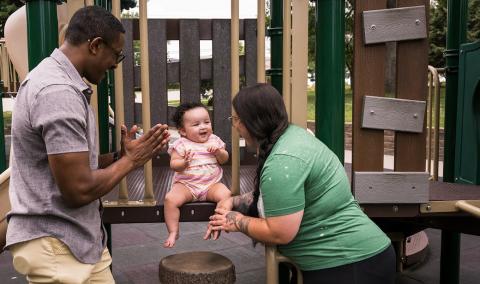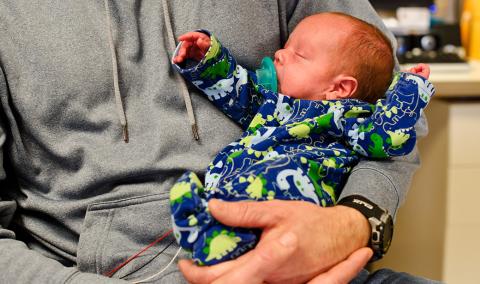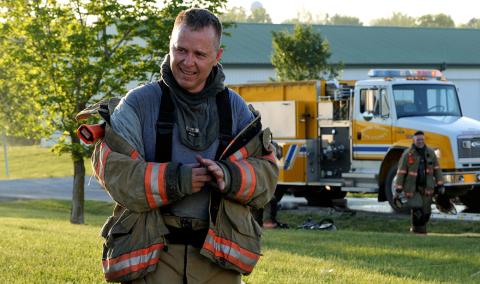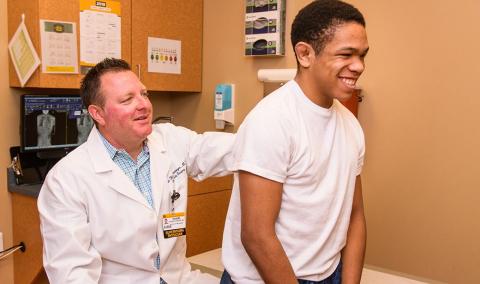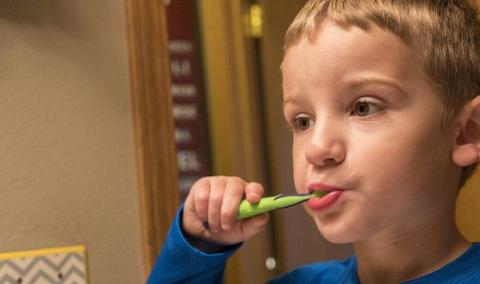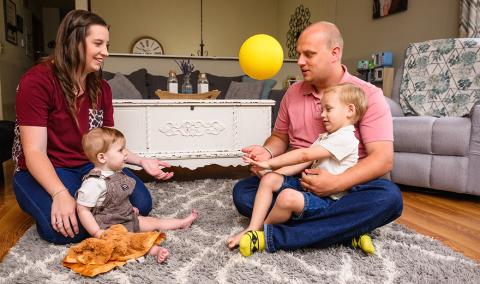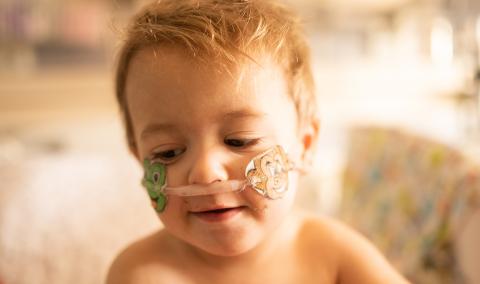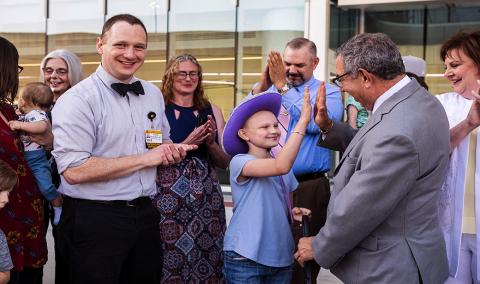Our Aerodigestive Program experts diagnose and treat children with complex airway abnormalities, digestive issues, and pulmonary conditions that affect their eating, breathing and sleeping.
The term "aerodigestive" refers to the organs and tissues of the respiratory tract and the upper part of the digestive tract. This includes the mouth and throat (oropharynx), voice box (larynx), windpipe (trachea), lungs, food pipe (esophagus), and stomach.
Conditions of the aerodigestive system often are complex because each of the systems is linked and interconnected, and a problem in one system can cause issues in another. This requires a team of experts from each of the relevant medical specialties to properly diagnose and treat your child's symptoms.
Who should be evaluated by the Aerodigestive Program?
The typical child evaluated by the Aerodigestive Program is a child who experiences one or more of the following:
- Difficulty with eating or drinking
- Failure to gain weight
- Frequent coughing or choking episodes while eating or drinking
- A wet cough or voice
- Frequent diagnoses of pneumonia
- Multiple hospitalizations for illnesses that look like a cold
- An early diagnosis of asthma (younger than 6 months old)
Sometimes, these children have been born premature, had a stay in the Neonatal Intensive Care Unit (NICU), or had a diagnosis of cerebral palsy, global developmental delays, or a genetic syndrome.
We know how to care for kids — that's all we do
Our Aerodigestive Program team focuses exclusively on diagnosing and treating children. The team includes experts from the following pediatric specialties:
- Otolaryngology (ear, nose, and throat)
- Pulmonology (lungs)
- Gastroenterology (digestive tract)
- Speech pathology (feeding and swallowing)
- Nutrition (registered dietitians)
- Social work
- Pediatric surgery (general and cardiothoracic)
- Pediatric neurology
- Pediatric genetics
- Pediatric physical medicine and rehabilitation
Our Aerodigestive Program has a dedicated coordinator. This is a nurse who is specially trained in the care of patients with swallowing disorders. Our coordinator makes sure that you understand the care being provided to your child and are aware of upcoming procedures. This nurse is only a phone call away with questions or concerns about your child's condition.
How we diagnose aerodigestive problems
Our experts in the Aerodigestive Program meet as a team to determine the tests and procedures needed to diagnose your child. These might include:
- Blood tests
- Breathing tests
- Impedance/pH probe to measure acid in the esophagus
- Swallow (video fluoroscopic) study
- Imaging of the chest or esophagus (X-rays or computed tomography)
- Flexible laryngoscopy to view throat and voice box
The advantage of the "triple scope"
For many children, an evaluation of the entire upper aerodigestive tract might be recommended.
This involves three evaluation studies, when taken together are called triple endoscopy or "triple scope." This evaluation provides direct observation of all structures in the aerodigestive tract by each specialist. Coordinating these procedures decreases your child's exposure to anesthesia and allows for a more comprehensive evaluation. The triple scope procedures include:
- Direct rigid laryngobronchoscopy (DLB) by a pediatric otolaryngologist
- Flexible bronchoscopy with bronchoalveolar lavage (BAL) by a pediatric pulmonologist
- Esophagogastroduodenoscopy (EGD) with biopsies by a pediatric gastroenterologist
Common conditions diagnosed by the Aerodigestive Program
The Aerodigestive Program focuses on providing comprehensive diagnosis services for children suffering from complex problems. Once we have identified the condition, your treatment might be with one or more experts from our pediatric specialties listed above.
Breathing conditions
There are a variety of airway conditions that stem from issues affecting the voice box (larynx) or breathing tube (trachea).
- Stertor, stridor and wheezing. These can be signs of airway problems such as subglottic stenosis, tracheal stenosis, or vocal cord dysfunction/paralysis.
- Laryngomalacia, tracheomalacia or bronchomalacia. These conditions refer to abnormalities with the voice box (laryngomalacia), trachea (tracheomalacia) and lungs (bronchomalacia) that can cause noisy breathing.
- External esophageal or airway compression from a vascular ring or sling: rare conditions in which blood vessels are wrapped around the esophagus or airway, causing obstruction and difficulty with breathing and swallowing.
- Laryngeal cleft, laryngotracheal cleft, laryngotrachealesophageal cleft. These are a group of rare inherited disorders in which there is an abnormal opening between the airway and the esophagus. This can cause children to inhale food into their airway. These conditions require surgery to repair, and this can significantly improve a child's swallowing function
Learn more about pediatric ear, nose, and throat conditions.
Digestive conditions
- Eosinophilic Esophagitis: an autoimmune disease that increase inflammation in the esophagus
- Gastroesophageal reflux (GERD)
- Feeding disorders such as dysphagia, or swallowing difficulties, chronic aspiration, G-tube dependency
Learn more about pediatric gastroenterology conditions.
Lung conditions
- Aspiration pneumonia/pneumonitis, or reoccurring pneumonia
- Chronic cough
Learn more about pediatric pulmonary conditions.
Treatment and follow-up care
Once we have met your child and reviewed his or her evaluation tests, our team meets as a group to discuss and develop a tailored treatment plan. The plan likely will include dietary modifications, medications, and could involve surgery. No matter your child's treatment, our team will be by your side throughout the process, providing follow-up visits to ensure your child is doing well. The Aerodigestive Program is part of Children's Hospital, which means you have access to a wide array of other medical experts who specialize in the care of children.
Related Conditions & Treatments
- Adolescent Medicine
- Chest Wall Deformities
- Down Syndrome
- Emergency Care for Kids
- Gastrostomy and Feeding Access Program
- Hyperbaric Oxygen Therapy
- Juvenile Diabetes
- Neonatology
- Pediatric Anesthesiology
- Pediatric Cancer
- Pectus Carinatum
- Pectus Excavatum
- Pediatric Cardiology
- Pediatric Dermatology
- Pediatric Development and Behavior
- Pediatric ENT (Ear, Nose and Throat)
- Pediatric Epilepsy
- Pediatric Eye Care
- Pediatric Gastroenterology
- Pediatric Infectious Diseases
- Pediatric Inpatient Rehabilitation
- Pediatric Nephrology
- Pediatric Neurology
- Pediatric Neurosurgery
- Pediatric Orthopaedics
- Pediatric Plastic Surgery
- Pediatric Primary Care
- Pediatric Psychiatry
- Pediatric Pulmonary Medicine
- Pediatric Sleep Medicine
- Pediatric Surgery
- Pediatric Surgical Services
- Pediatric Urology
- Pediatric Vascular Anomalies
- Pediatric Weight Management
- Sickle Cell Disease
- Aerodigestive Program





